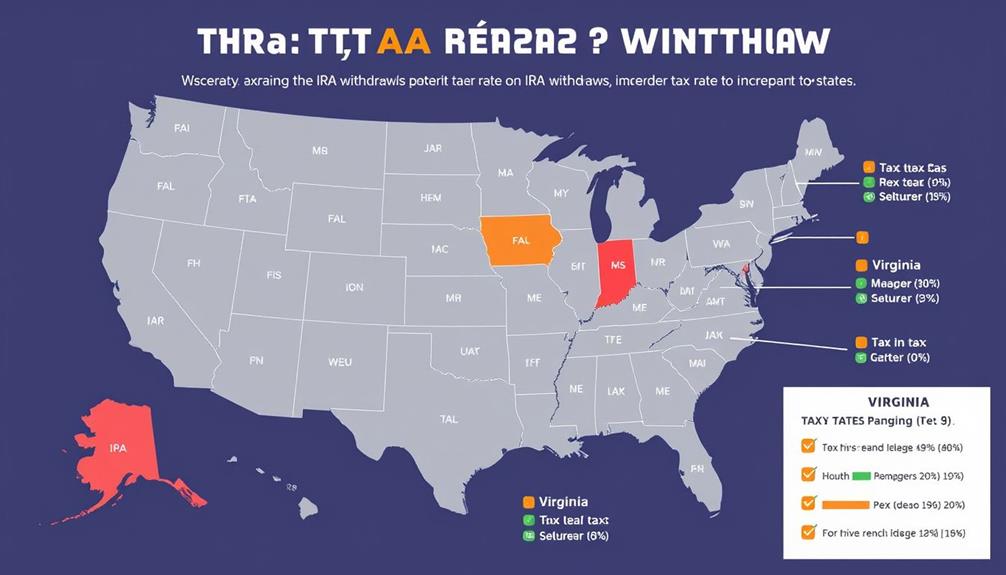When you take out money from your traditional IRA in Virginia, you will have to pay state income tax, which can range from 2% to 5.75%. If you are 65 years old or older, you may qualify for a $12,000 deduction on these withdrawals, but it will be reduced for higher income levels. Virginia differs from some states in that it does tax IRA distributions, so it is important to understand how this can impact your retirement planning. To effectively lower your tax burden, it may be beneficial to seek advice from a tax professional who can offer personalized guidance on maximizing deductions and minimizing overall liabilities. There is a wealth of useful information available.
Key Takeaways
- Traditional IRA withdrawals are subject to Virginia state income tax, ranging from 2% to 5.75% based on income levels.
- Seniors aged 65+ can deduct up to $12,000 from their taxable income for IRA withdrawals, reducing their tax burden significantly.
- The $12,000 deduction phases out for AGI exceeding $62,000 (single) or $87,000 (married), impacting tax liability for higher earners.
- Roth IRA distributions are generally tax-free in Virginia if they meet specific conditions, offering a tax advantage for retirees.
- Consulting a tax professional is recommended to navigate Virginia's tax rules and optimize withdrawal strategies for minimizing tax liabilities.
Overview of Virginia Tax Structure

When you look at Virginia's tax structure, you'll notice it features a graduated income tax system with rates that range from 2% to 5.75%. This means your income tax liability increases as your income grows.
If you're filing as single, you need to file if your adjusted gross income exceeds $11,950, while married couples filing jointly must do so if they earn over $23,900.
Additionally, Virginia imposes a property tax, with an average effective tax rate of about 0.87% of your home's assessed value. The typical property tax bill hovers around $1,764, so be prepared for that expense.
Sales tax in Virginia is set at 5.3%, but many localities add their own taxes, pushing the combined rate up to 7%. This relatively low sales tax rate makes Virginia a favorable place for consumers.
When considering retirement income, be mindful of how these state taxes, including the income tax and property tax, can impact your overall financial situation, especially as you plan for IRA withdrawals in the future.
Taxation of IRA Withdrawals

Understanding Virginia's tax structure helps illuminate how IRA withdrawals are taxed in the state. The taxation of IRA withdrawals can greatly impact your retirement income planning. Here's what you need to know:
- Traditional IRA withdrawals are subject to Virginia state income tax.
- Tax rates range from 2% to 5.75%, depending on your income bracket.
- Seniors aged 65 and older can claim a deduction of up to $12,000 on IRA withdrawals.
- This deduction phases out for those with an adjusted gross income (AGI) over $62,000 if single or $87,000 if married filing jointly.
- Distributions from Roth IRAs are typically tax-free, provided certain conditions are met.
When considering the tax implications, it's crucial to recognize how these factors can affect your overall financial security.
For traditional IRAs, prepare for state income tax on withdrawals, while taking advantage of deductions if you qualify as a senior.
In contrast, Roth IRAs offer tax-free distributions, which can provide a financial cushion in retirement.
Being informed about these details will help you navigate your IRA withdrawals more effectively.
Deductions for Seniors

Many seniors in Virginia can greatly benefit from deductions on their taxable income, particularly when it comes to pension income and retirement account withdrawals.
If you're aged 65 and older, you can deduct up to $12,000 from your taxable income for pension income and IRA withdrawals. This deduction is especially advantageous for those born on or before January 1, 1939, while the amount can vary for seniors born after that date based on their income.
If your total retirement income is below $12,000, you might end up paying no state income tax at all due to these deduction provisions.
This age deduction notably reduces your taxable income, easing the overall tax burden for retirees who rely on IRA withdrawals.
Understanding the eligibility criteria and income thresholds for these deductions is essential for optimizing tax benefits.
By taking advantage of the senior deduction, you can effectively lower your taxable income and retain more of your hard-earned savings.
Be sure to evaluate your retirement income and confirm you're utilizing the full benefits available to you as a senior in Virginia.
Comparison With Other States

Virginia's approach to taxing IRA withdrawals contrasts sharply with several other states, particularly those that have adopted more favorable tax policies for retirees.
When you consider your financial goals in retirement, it's vital to understand how Virginia's tax structure stacks up against others.
- Florida and Alaska: No state income tax on retirement income.
- California: IRA withdrawals fully taxable, with rates from 1% to 14.4%.
- Arizona: Flat tax rate of 2.5% on IRA withdrawals, lower than Virginia's rates.
- Illinois: Taxes IRA distributions at a flat rate of 4.95%, while not taxing Social Security benefits.
- Virginia: State income tax applies to traditional IRA withdrawals, though seniors get deductions up to $12,000.
Compared to other states, Virginia's taxation on IRA distributions may feel burdensome, especially if you're relying heavily on these funds.
Understanding how your IRA withdrawals are taxed is necessary for effective retirement planning.
Professional Tax Assistance

When planning for IRA withdrawals, seeking professional tax assistance can make a considerable difference in your overall financial strategy. Consulting a tax professional in Virginia helps you navigate the complex state tax rules associated with traditional IRA distributions.
Experienced CPAs understand the implications of these withdrawals on your Virginia taxes and can provide tailored advice to guarantee compliance and optimize your tax situation.
For instance, seniors can benefit from a $12,000 deduction on traditional IRA distributions, which can greatly reduce your tax liability. A financial advisor can clarify how these distributions, though taxable, may be offset by age-related tax deductions—particularly if your adjusted gross income (AGI) is lower.
Moreover, professional tax assistance can help you plan your withdrawals strategically to minimize overall tax liability, especially considering Virginia's progressive income tax rates.
Tax professionals are also knowledgeable about phased-out deductions for higher AGI, which can considerably impact the tax burden on your retirement income. By utilizing a tax advisor's services, you can navigate these complexities and make informed decisions that maximize your financial well-being during retirement.
Frequently Asked Questions
Are IRA Withdrawals Taxable in Virginia?
Yes, IRA withdrawals are taxable in Virginia. They're considered part of your taxable income, subject to state income tax rates. However, seniors aged 65 and older can claim deductions to reduce their taxable income.
Do You Pay State Taxes on IRA Withdrawals?
Think of those pesky taxes like shadows; they follow you everywhere. Yes, you pay state taxes on IRA withdrawals in Virginia. However, seniors can enjoy some deductions, easing the burden a bit. Consulting a tax pro helps!
What Is the Tax Break for Seniors in Virginia?
In Virginia, seniors can claim a state income tax deduction of up to $12,000 based on income. This considerably lowers your taxable income, offering important financial relief as you enjoy your retirement years.
Does Virginia Tax VRS Benefits?
Yes, Virginia taxes VRS benefits. Picture your retirement nest egg slowly dwindling as state taxes nibble away. If you're 65 or older, you can claim a $12,000 deduction, but income limits might affect that.
Conclusion
Maneuvering state tax implications for IRA withdrawals in Virginia can feel like steering a boat through foggy waters. You want to reach your financial destination without getting lost in confusion. Remember, understanding how these withdrawals are taxed can save you from unexpected storms. Just as a seasoned sailor relies on the stars, you can rely on the resources and assistance available to guide you through. With the right knowledge, you can sail smoothly into your retirement years.









